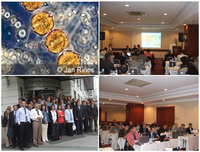Mediterranean countries agree on measures to address the risk of alien species invasions via ships' ballast water and sediments – Jun 01, 2010
Athens/Malta, 10th June 2010 – Representatives from eighteen Contracting Parties to the Barcelona Convention have agreed upon eight strategic priorities to efficiently address the issue of ships’ ballast water and invasive species in the Mediterranean[1], as well as on measures to be taken at national, sub-regional or regional level to put into effect these strategic priorities.
“The Mediterranean Sea is a world’s major shipping area with more than 300,000 port calls per annum and more than 10,000 ships transiting this busy highway every year. Ballast water discharges by ships can have a negative impact on the marine environment,” said Fréderic Hébert, Director of REMPEC – the Regional Marine Pollution Emergency Response Centre for the Mediterranean Sea of UNEP/MAP[2].
“Large tankers and bulk cargo carriers, commonly operating in the Mediterranean, use a large amount of ballast water, which is often taken on in the coastal waters in one region after ships discharge wastewater or unload cargo, and discharged at the next port of call, wherever more cargo is loaded”.
There are hundreds of organisms carried in ballast water, including plants, animals, viruses and bacteria. These materials often include non-native, nuisance, exotic species that can cause extensive ecological and economic damage to the aquatic ecosystem – generally referred to as alien or invasive species.
Invasive alien species have serious economic, environmental and human health impacts and are now recognized as one of the greatest threats to biodiversity globally. In marine and coastal environments, invasive species have been identified as one of the four greatest threats to the world’s oceans.
In particular, they can have economic impacts on fisheries by smothering or killing fish and other species, tourism (jellyfish), destruction of facilities, settling on buoys, vessels and ropes, aquaculture harvests. They also have negative impacts on the ecosystem, competing with Mediterranean native species for food and space and modifying the habitat.
Others can also have health impacts due to their toxicity, like the micro-algae Alexandrium acatenella responsible for creating "red tides", which is a species known for producing paralytic shellfish poisoning (PSP) toxins. The toxins can affect humans, other mammals, fish and birds. It is responsible for numerous human illnesses and several deaths after consumption of infected shellfish.
“Ships’ ballast water is of particular concern as a vector of introduction of invasive alien species in the Mediterranean”, said Maria Luisa Silva, Officer-in-Charge of the UNEP Mediterranean Action Plan. “Research shows that the Mediterranean marine ecosystem and resources have been and continue to be severely compromised by invasive species, and remain at high risk of further invasion as maritime traffic escalates. Scientists estimate the rate of biological invasions in the Mediterranean to be one new species entry every nine days”[3].
When meeting earlier this month, the countries representatives discussed a Mediterranean strategy aimed at addressing the alien species issue, and agreed on a set of eight priorities, aiming at achieving a regional harmonised approach in the Mediterranean on ships’ ballast water control and management.
In addition, countries also supported a proposal regarding voluntary interim arrangements on ship’s ballast water exchange in the Mediterranean as indicated by the International Convention for the Control and management of Ships’ Ballast Water and Sediments[4].
The countries delegations considered that as the Convention is not yet in force, such voluntary measures were called for to activate actions and address the problem in the Mediterranean.
Furthermore, the delegations unanimously agreed that a notification of these voluntary interim arrangements be sent to the International Maritime Organisation (IMO) prior to the forthcoming Meeting of the Contracting Parties to the Barcelona Convention, which is foreseen for November 2011. The countries representatives therefore requested REMPEC to facilitate this matter by officially liaising with the Contracting Parties of the Barcelona Convention.
[1] The Istanbul meeting (1-3 June) was attended by delegations from Albania, Algeria, Croatia, Cyprus, the European Community, Egypt, Greece, Israel, Italy, Libya, Malta, Monaco, Montenegro, Morocco, Spain, the Syrian Arab Republic, Tunisia and Turkey. Observers from the Mediterranean Network for Operational Oceanography Network (MOON), the International Union for Conservation of Nature (IUCN), and the International Ocean Institute (IOI) also participated in the discussion.
The Strategy document discussed during the Meeting is the result of the work of the Mediterranean Regional Task Force and of its Focus Groups, which was established in September 2008 with the mandate to develop a Strategic Action Plan for the region.
The Task Force is composed of all Contracting Parties to the Barcelona Convention, and is assisted in his work by the relevant Organisations, namely the International Maritime Organisation (IMO-GloBallast), the Regional Marine Pollution Emergency Response Centre for the Mediterranean Sea (REMPEC), acting as Secretariat of the Task Force, and the Regional Activity Centre for Specially Protected Areas (RAC/SPA), which is associated to the scientific aspects of the process.
A Timetable setting the timeline targets for the implementation of the Strategy and Action Plan is also included in the document.
[2] The Malta-based REMPEC assists Mediterranean coastal states to build up their national prevention and response capabilities to be prepared for major marine pollution incidents. The centre also facilitates cooperation between countries in combating accidental marine pollution from a range of hazardous substances including oil.
REMPEC is managed under the joint auspices of UNEP’s Mediterranean Action Plan (UNEP/MAP) and the International Maritime Organisation (IMO).
[3] A. Zenetos, E. Meriç, M. Verlaque, P. Galli, C. F. Boudouresque, A. Giangrande, M. E. Çınar and M. Bilecenoğlu (2008), Mediterranean Marine Science 9/1, 119-165. There are 903 alien species reported in the Mediterranean basin based on literature up to April 2008.
[4] In conformity with the Regulation B-4 of the International Convention for the Control and management of Ships’ Ballast Water and Sediments


